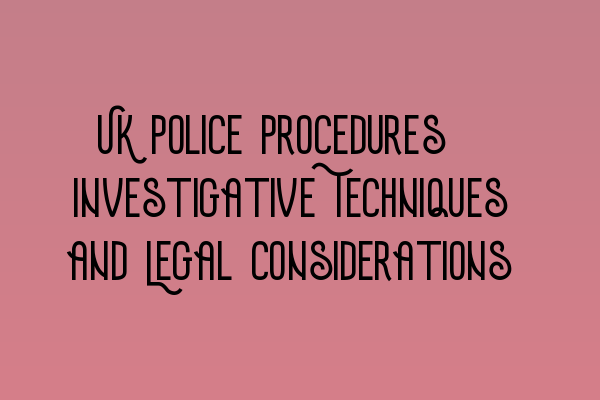UK Police Procedures: Investigative Techniques and Legal Considerations
When it comes to criminal investigations, the procedures followed by the police in the UK play a crucial role in ensuring a fair and just outcome. These procedures involve a combination of investigative techniques and legal considerations that are designed to uphold the principles of justice and protect the rights of all individuals involved. In this article, we will explore some of the key aspects of UK police procedures, including their investigative techniques and the legal considerations that guide their actions.
Investigative Techniques
The police employ various investigative techniques to gather evidence and uncover the truth in criminal cases. One of the most common techniques is conducting interviews and interrogations. During these sessions, the police question suspects, witnesses, and other relevant parties to extract information that may be crucial to the case.
Additionally, the police often rely on surveillance systems, including CCTV cameras and undercover operations, to monitor the activities of individuals suspected of criminal activities. These techniques help them gather evidence and establish connections between suspects and criminal acts.
Forensic science also plays a vital role in police investigations. Experts in fields such as DNA analysis, fingerprinting, and ballistics provide valuable scientific evidence that can link suspects to crime scenes and help establish their guilt or innocence.
Another crucial investigative technique is the use of informants. Informants can provide valuable insider information that can lead to breakthroughs in investigations. However, the police must handle informants with caution to protect their identity and ensure their safety.
It is important to note that these investigative techniques must be conducted within the boundaries of the law to ensure evidence is admissible in court and that individuals’ rights are not violated.
Legal Considerations
While conducting their investigations, the police must adhere to strict legal considerations to ensure a fair and just process. One key consideration is the requirement of obtaining search warrants. Before conducting searches of individuals’ properties, the police must obtain a warrant from a judge, demonstrating probable cause for the search.
The police must also be mindful of individuals’ rights during the process of arrest and detention. They must inform suspects of their rights, including the right to remain silent and the right to legal representation. Failure to do so can result in evidence being deemed inadmissible in court.
During the gathering of evidence, the police must follow proper chain of custody procedures to maintain the integrity of the evidence. This involves documenting the handling and storage of evidence to ensure it is not tampered with or compromised in any way.
Furthermore, the police must adhere to the principles of proportionality and necessity in their actions. They should only use force when absolutely necessary and in proportion to the situation at hand.
Conclusion
The investigative techniques and legal considerations followed by the police in the UK are essential for ensuring a fair and just criminal justice system. By employing a range of investigative techniques such as interviews, surveillance, forensics, and informant networks, the police aim to gather evidence and uncover the truth. However, they must also be guided by legal considerations to protect the rights of individuals and ensure evidence is admissible in court.
To learn more about the SQE Criminal Law & Practice in the UK and prepare for your exams, check out our related articles:
